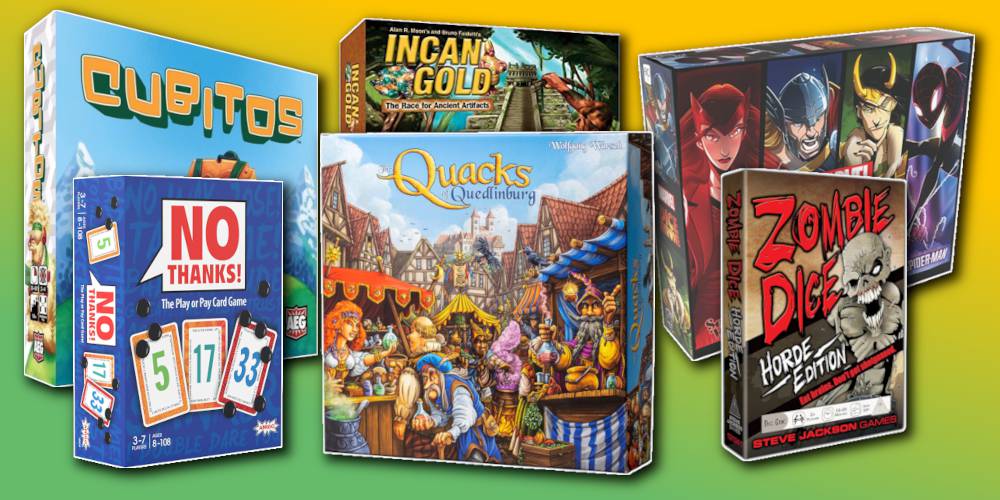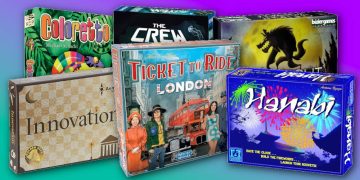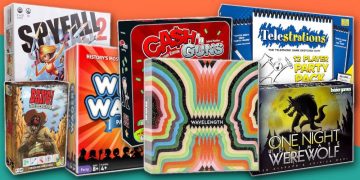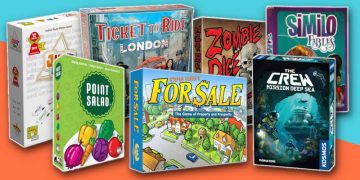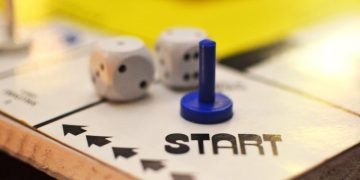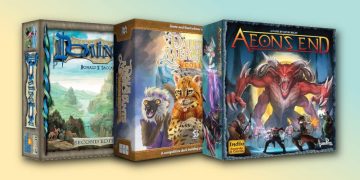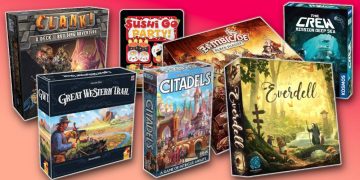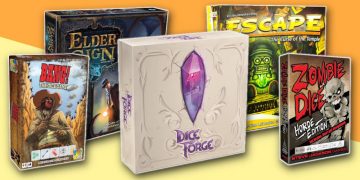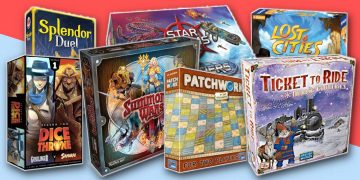The push-your-luck genre of board games is a polarizing one. While strategy and tactics can certainly play a role, these games demand that you surrender your fate to chance—at least to some degree.
Push your luck means more than just "games with randomness." Specifically, these games involve accumulating potential rewards and risking what you've gained in order to gain more. If you push your luck too far, you lose what you could've gained.
These games are all about risk management, about deciding whether you're content with what you have, about playing the odds in order to secure the lead (or catch up from behind).
Push-your-luck games provide a visceral thrill with every decision, with every roll of the dice, with every flip of a card, with every token pulled from a bag of possibilities. They're just plain fun.
Here are my picks for the best push-your-luck board games and card games that fully capture the essence of these thrills.
10. No Thanks!
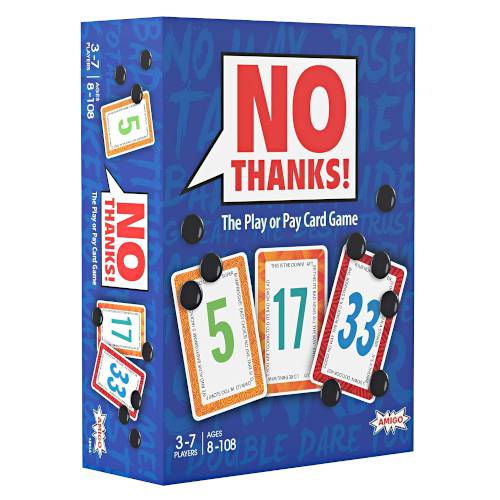
Designed by Thorsten Gimmler
Supports 3 to 7 players
About 15 to 30 minutes
Major genres: Card game, push your luck, set collection
No Thanks! is a simple game where you're collecting cards valued 3 to 35 and trying to score the lowest points. Each card you collect gives you points equal to its value, so you don't want cards.
Every round, a card is drawn from the deck and players take turns doing one of two actions: either collect the card OR pay one chip to avoid collecting it. If you run out of chips, you must take the card—but when you take a card, you get all the chips that were paid to it.
Furthermore, if you collect consecutive cards, they combine to score the value of the lowest card in the run. For example, if you have cards 24, 25, and 26, they all score as just 24 points.
Maybe the 25 card comes out, which would let you bridge your 24 and 26 cards (which are currently scoring 50 for you). But you pay a chip on it because nobody else wants it and you know they'll pay chips to avoid it.
But how far do you push your luck? Maybe you get greedy and you send it around one too many rounds, someone takes it for the accumulated chips, and you're left with no chips and a whopping 50 points instead of 24.
9. Incan Gold
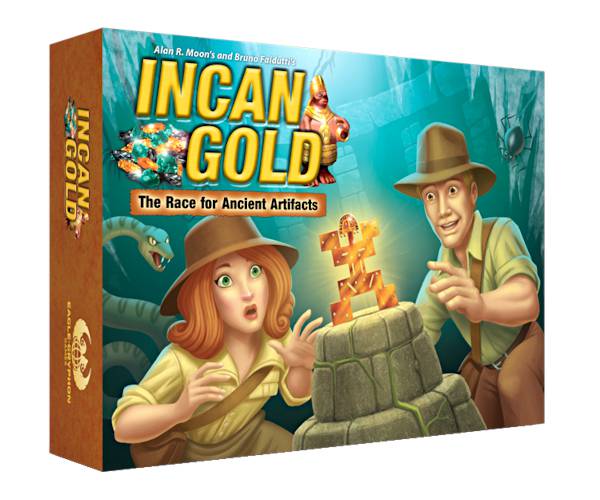
Designed by Bruno Faidutti and Alan R. Moon
Supports 3 to 8 players
About 20 to 40 minutes
Major genres: Push your luck, simultaneous action
Incan Gold is push-your-luck distilled into a very simple game—one that can be nerve-wracking when played with the right group.
In this game, you're all Indiana Jones-style archaeologists venturing down into an ancient temple full of gems. Your goal is to acquire as much loot as you can and escape before the temple collapses.
Every round, a card from the temple deck is flipped over, possibly revealing gems. Those gems are split evenly between everyone still in the temple, and any leftover gems are left on the ground.
And every round, before the next card is flipped over, players simultaneously decide whether to leave or keep going. Anyone who decides to leave is now safe, and they also get to scoop up leftover gems on their way out, but they can't acquire any more.
Meanwhile, those who remain in the temple share their loot with fewer and fewer people. However, if anyone stays too long and the temple collapses while they're still inside, they must leave with nothing.
8. Zombie Dice Horde Edition
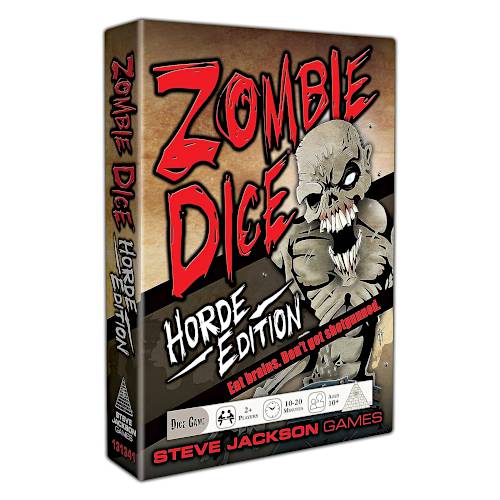
Designed by Steve Jackson
Supports 2 to 8 players
About 10 to 20 minutes
Major genres: Dice game, push your luck
Zombie Dice might just be the simplest push-your-luck dice game out there, which makes it one of the best filler-style games to include in any board gaming collection.
In this Yahtzee-style game, you roll three custom dice and hope to collect Brains. But the custom dice have more than just Brains on them—there are also Footsteps (which you can reroll) and Shotguns (which you can't).
When you're done, you can choose to roll three more dice, and after that, you can choose to roll even more. It's up to you when to stop. As soon as you stop, you count all the Brains and earn that many points.
The thing is, the moment you ever roll three Shotguns, you're blasted and you lose ALL the Brains you rolled that turn. Think you can keep rolling and avoiding Shotguns? How lucky do you think you are?
Note: Zombie Dice Horde Edition includes the base game and two expansions that improve gameplay even further. If the game sounds interesting, I highly recommend getting the Horde Edition for the full experience.
7. Port Royal
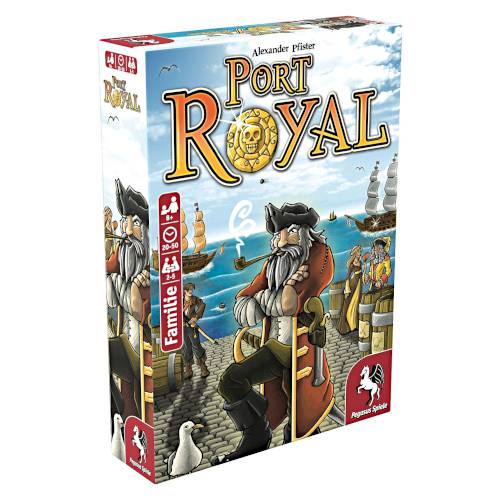
Designed by Alexander Pfister
Supports 2 to 5 players
About 20 to 40 minutes
Major genres: Card game, push your luck, set collection
Port Royal is an oft-overlooked game because it came out way back in 2014, a few years before the hobby really exploded. But if you're looking for a thrilling push-your-luck card game, it's still one of the best.
The crux of the game involves flipping over cards, one by one, from the main deck. On your turn, you can flip over as many cards as you want and choose to stop at any time. Along the way, you'll reveal cards that have people, ships, expeditions, and tax events.
Based on what cards are revealed, you can choose to take (or use) a certain number of them, which will earn you coins. Then, other players can pay you to take (or use) the remaining unused cards.
However, if you choose to keep flipping cards and two matching ships ever appear, then you're busted—all the cards are lost, you gain nothing, and your turn immediately ends.
6. King of Tokyo
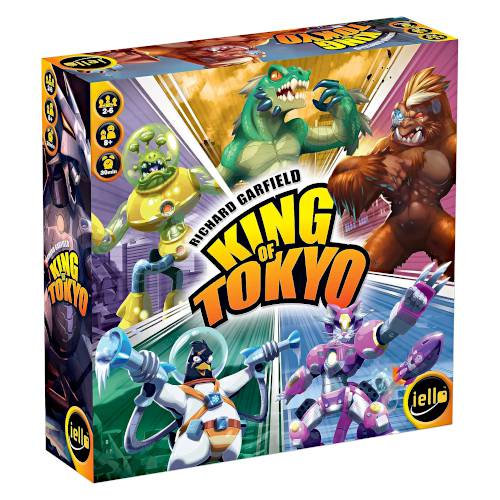
Designed by Richard Garfield
Supports 2 to 6 players
About 20 to 40 minutes
Major genres: Dice game, king of the hill, push your luck
King of Tokyo is a push-your-luck game in two ways, and the interplay between those two aspects makes this a nail-biting, jump-out-of-your-seat experience that's fun for newbies and veterans alike.
The first push-your-luck aspect: on your turn, you roll six custom dice with outcomes like Attack, Heal, Energy, and 1/2/3 Victory Points. You get two chances to reroll any number of them, allowing you to push your luck and aim for whatever specific actions you're hoping to take.
The second push-your-luck aspect: one player is always in Tokyo while everyone else is outside Tokyo, and everyone who's outside Tokyo can only attack whoever is in Tokyo. If you're in Tokyo and you get attacked you can choose to switch places with your attacker.
Staying in Tokyo earns you victory points, but how long can you stay in there without dying? Is it worth losing some health to gain a few extra points? Stay too long and you might regret it!
5. Clank! Catacombs
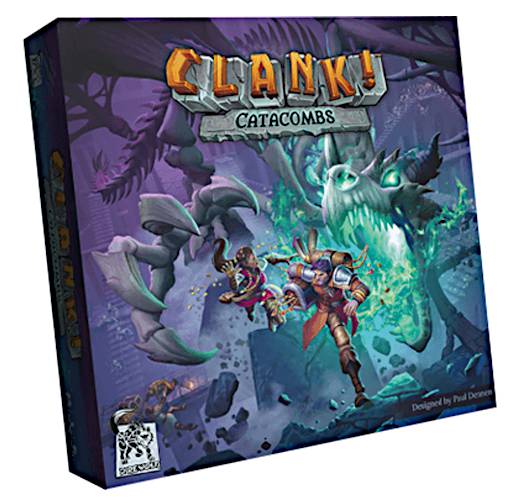
Designed by Paul Dennen
Supports 1 to 4 players
About 45 to 90 minutes
Major genres: Deckbuilding, dungeon crawl, push your luck
Clank! Catacombs is an incredible game that deserves to be ranked higher, but it's this low on the list because the push-your-luck element isn't as pronounced as the other games higher up.
In this deckbuilding game, you're exploring a deep dungeon and trying to acquire more valuable treasures than everyone else. The deeper you venture, the more likely you'll find the good stuff.
But the dungeon is also home to a nasty dragon. That dragon attacks you every so often, and that dragon grows stronger over time. The longer you stay in the dungeon, the more dangerous it is for you.
In Clank! Catacombs, the most important thing is to get out alive—if you amass tons of treasures but die while you're still too deep in the dungeon, none of it matters. Do you risk another turn to delve a little deeper? Or are you going to turn back, content with what you've found?
4. Cubitos
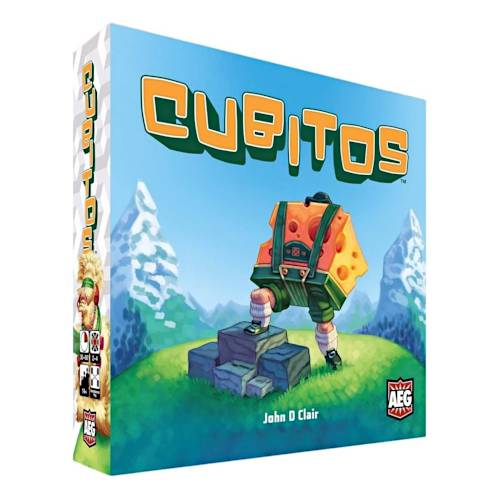
Designed by John D. Clair
Supports 2 to 4 players
About 30 to 60 minutes
Major genres: Dice game, push your luck, race to finish
Cubitos takes the commonly used roll-and-reroll mechanic of dice and combines it with a literal race. You're trying to navigate the board and reach the end before everyone else, but if you push your luck too far on any given turn, you'll greatly impede your progress.
In Cubitos, you start with some basic dice that have faces for coins, movement, and blanks. You can use coins to buy better dice, and those better dice provide special bonuses and benefits.
On your turn, you choose nine of your dice to roll, setting aside any results that aren't blank. You can then choose to reroll the remaining blank dice, and again set aside any non-blank results.
Rinse and repeat as many times as you want, but if you ever choose to reroll and the results are all blank, you bust! You lose all the dice actions you could've had, causing you to fall behind in the race.
Cubitos is a great push-your-luck game with a bit more substance than your usual push-your-luck games. It's a fuller experience that's fun for the whole family but still plays relatively quickly.
3. Can't Stop
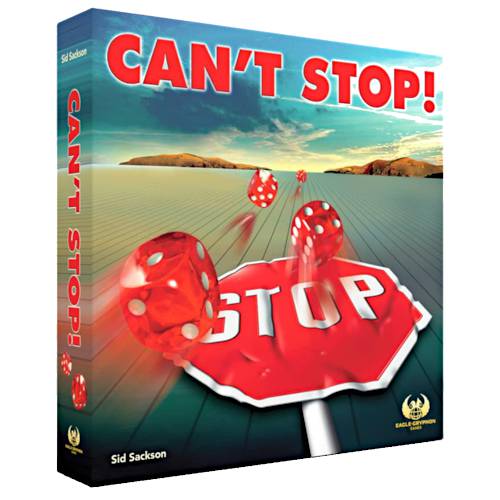
Designed by Sid Sackson
Supports 2 to 4 players
About 20 to 40 minutes
Major genres: Dice game, push your luck, race to finish
Can't Stop was one of the pioneers of the push-your-luck genre. This game first released in 1980, long before all the other board games and card games featured on this list. And yet, it's still one of the best.
In Can't Stop, you roll four regular dice on your turn, then separate the results into two pairs. For example, if you roll dice results of 2 4 5 6, you could combine them as 2+4 and 5+6, or 2+5 and 4+6, etc.
Then, you have markers that move along numbered tracks that correspond to your dice pairs. For example, if you rolled 2+4 and 5+6, one of your markers would move on track 6 and the other would move on track 11. (The tracks with lower probability are shorter!)
After you've moved, you can roll again or stop.
The thing is, you only have three markers; once a marker is on a track, it's committed to that track. And if your roll results in no legal moves for your markers, you lose ALL progress you made on that turn. Your progress is only secured when you choose to stop.
Can't Stop is dice-rolling fun distilled. The name is perfectly apt because once you start rolling, you really can't stop. It's so addicting!
2. Dice Throne
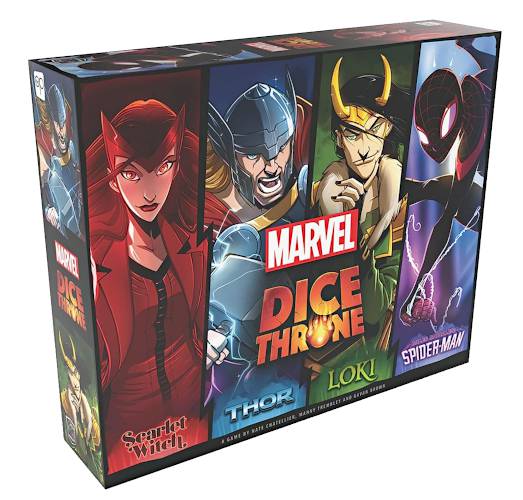
Designed by Nate Chatellier and Manny Trembley
Supports 2 to 4 players
About 30 to 45 minutes
Major genres: Dice game, hand management, push your luck
Marvel Dice Throne is the latest in the Dice Throne series, with eight new characters who are compatible with all previous Dice Throne characters, yet flavored to fit their respective Marvel identities.
Not only is Dice Throne one of the best takes on the Yahtzee-style push-your-luck mechanic of rerolling dice, it's one of the best one-versus-one games out there that play in half an hour.
In Dice Throne, every character has their own set of custom dice. On your turn, you roll (and reroll) these dice, which are used to activate your unique abilities. Every ability requires a specific combination of dice to activate, with some much harder to get than others.
You'll often roll a mid-strength ability that's one or two dice off from one of your stronger abilities. But do you want to risk rerolling those dice and possibly losing that mid-strength ability? Oh, it's great fun!
Note: In addition to Marvel Dice Throne, you may also want to check out Dice Throne Season One and Dice Throne Season Two, which each contain eight unique characters. No matter which set(s) you get, any character can face off against any other character!
1. The Quacks of Quedlinburg
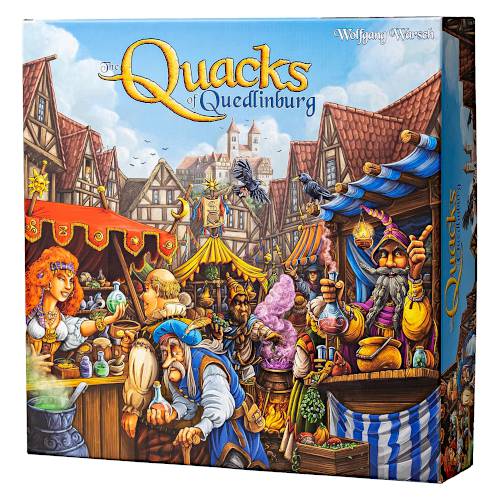
Designed by Wolfgang Warsch
Supports 2 to 4 players
About 30 to 45 minutes
Major genres: Bag building, push your luck, simultaneous action
The Quacks of Quedlinburg is the ultimate push-your-luck board game. The experience is often described as similar to a slot machine because you can't help but pull that lever just one more time—except in this case, instead of pulling a lever, you're pulling tokens out of a bag.
In The Quacks of Quedlinburg, you're throwing ingredients into your cauldron as you brew a potion. Those ingredients are pulled one-by-one from your bag, which starts off full of junk ingredients.
If you add too much junk to your cauldron, it'll explode! But you want to keep adding ingredients because more ingredients means a better potion, a better potion means more money, and money lets you buy more (better) ingredients to add to your bag for next time.
The Quacks of Quedlinburg perfectly captures the excitement of push-your-luck, as every time you plunge your hand back into your bag, you feel that rush of hope—and, sometimes, the devastation of pulling a bad token.
The Quacks of Quedlinburg has two expansions: The Herb Witches and The Alchemists. If you think you'll get them at some point, you can save money with The Quacks of Quedlinburg: MegaBox, which includes the base game and both expansions.
